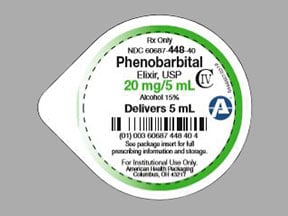
Phenobarbital Coupons & Savings Card – Discount Prices from $34.36
My prescription
Edit
473ML of 20MG/5ML, Phenobarbital (1 Bottle)
Select pharmacy

CVS
$40.02
COUPON PRICE
Albertsons
$34.36
COUPON PRICE
Walmart
$37.44
COUPON PRICE
Walgreens
$75.56
COUPON PRICEPhenobarbital savings card
Show this card to your pharmacist
Albertsons
$34.36
BIN
ID
PCN
GRP
019876
LH5DD23267
CHIPPO
LHX
Powered by
More prescriptions for epilepsy
More prescriptions for epilepsy
Phenobarbital dosage forms
Dosage Quantity Price from Per unit 473ML of 20MG/5ML 1 Bottle $34.36 $34.36 473ML of 20MG/5ML 2 Bottles $53.73 $26.86 473ML of 20MG/5ML 3 Bottles $67.45 $22.48
| Dosage | Quantity | Price from | Per unit |
|---|---|---|---|
| 473ML of 20MG/5ML | 1 Bottle | $34.36 | $34.36 |
| 473ML of 20MG/5ML | 2 Bottles | $53.73 | $26.86 |
| 473ML of 20MG/5ML | 3 Bottles | $67.45 | $22.48 |
Phenobarbital Warnings
Phenobarbital is a medication associated with several important safety considerations. Please review the following information carefully and discuss any concerns with your healthcare provider.
Dependence and Withdrawal: There is a risk of developing dependence on phenobarbital, meaning your body may require it to function normally. Always follow your healthcare provider’s instructions regarding dosage and frequency. Misuse can lead to ineffective treatment and severe side effects, including dangerously slow breathing. If you need to discontinue use, consult your provider to avoid life-threatening withdrawal symptoms such as seizures and delirium. Those with a history of substance use disorder, mental health issues, prolonged use of high doses, or those who stop the medication abruptly are at increased risk.
Drowsiness: Phenobarbital can cause significant drowsiness, impairing your ability to think, react, and focus. This risk is heightened if combined with other sedative medications or alcohol. Ensure you understand how phenobarbital affects you before engaging in activities like driving. Contact your healthcare provider if you experience excessive drowsiness. Risks increase with high doses, alcohol consumption, and concurrent use of other sedative drugs.
Extreme Excitement: Some individuals may experience agitation, excitement, or confusion instead of calmness. This is more common in individuals with pain conditions, older adults, and children. Notify your provider if you experience these symptoms. Risks include a history of pain conditions, age-related factors, and extreme weakness.
Respiratory Depression: Phenobarbital may cause dangerously slow breathing, particularly when taken with alcohol or other central nervous system depressants such as benzodiazepines, opioids, or muscle relaxants. In cases of breathing difficulty or bluish discoloration of the lips, fingers, or toes, seek emergency medical assistance immediately. Those at risk include individuals taking depressants, consuming alcohol, older adults, and those with pre-existing respiratory conditions.
Harm to Newborns: Use of phenobarbital during pregnancy can harm the newborn, leading to withdrawal symptoms like weakness and sleep disturbances. Discuss the potential risks and benefits with your provider. Pregnant individuals using phenobarbital are encouraged to join the North American Antiepileptic Drug (NAAED) Pregnancy Registry to contribute to research on the safety of anti-seizure medications during pregnancy.
Contraindications: Phenobarbital should not be used by individuals with specific conditions, including allergies to barbiturates, a history of porphyria, severe liver issues, or severe respiratory problems with airway obstruction. Consult your healthcare provider if these conditions apply to you.
Always adhere to your healthcare provider's guidance when using phenobarbital and report any adverse reactions or concerns immediately.
Phenobarbital Side Effects
Common side effects:
- dizziness
- drowsiness
- sleepiness
- tiredness
- headaches
- loss of appetite
- nausea
- vomiting
Less common but important to monitor:
- poor balance or coordination
- constipation
- confusion
Serious side effects:
- fainting
- slowed heart rate
- dangerously slow or shallow breathing
- serious allergic reactions
- unusual changes in mood or behavior
- depression
- suicidal thoughts
Phenobarbital Interactions
Interactions with high risk of serious adverse effects and should be avoided:
- Primidone
- Ambenonium
- Bepridil
- Bromopride
- Cisapride
- Dronedarone
- Fluconazole
- Itraconazole
- Ketoconazole
- Mesoridazine
- Nelfinavir
- Pimozide
- Piperaquine
- Posaconazole
- Potassium
- Potassium Chloride
- Saquinavir
- Sparfloxacin
- Terfenadine
- Thioridazine
- Ziprasidone
Interactions with moderate risk that may require dose adjustment, closer monitoring, or timing changes:
- Darunavir
- Orlistat
- St. John's wort
- Artemether/lumefantrine
- Atazanavir
- Cobicistat
- Etravirine
- Lurasidone
- Ranolazine
- Rilpivirine
- Sofosbuvir
- Sorafenib
- Voriconazole
- Calcium channel blockers (e.g., felodipine, nimodipine)
- Opioid pain or cough relievers (e.g., codeine, hydrocodone)
- Alcohol
- Cannabis
- Sleep or anxiety drugs (e.g., alprazolam, lorazepam, zolpidem)
- Muscle relaxants (e.g., carisoprodol, cyclobenzaprine)
- Antihistamines (e.g., cetirizine, diphenhydramine)
